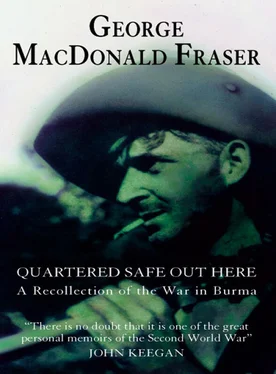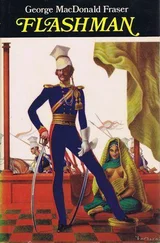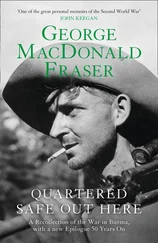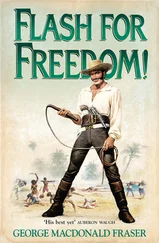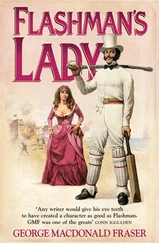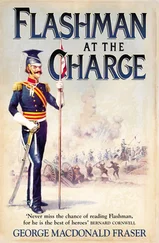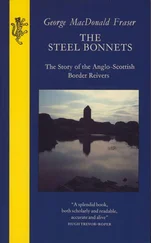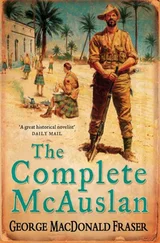George MacDonald Fraser
QUARTERED SAFE OUT HERE
A Recollection of the War in Burma
with a new Epilogue: Fifty Years On
DEDICATION Dedication Epigraph Introduction Chapter 1 Chapter 2 Chapter 3 Chapter 4 Chapter 5 Chapter 6 Chapter 7 Chapter 8 Chapter 9 Chapter 10 Chapter 11 Chapter 12 Chapter 13 Chapter 14 Chapter 15 Chapter 16 Chapter 17 Chapter 18 Epilogue: Fifty Years On Glossary About the Author Author’s Note Praise Other Works Copyright About the Publisher
FOR JACK, ANDREW, HARRY, AND TOM,
SOME DAY,
THE TALE OF A GRANDFATHER
EPIGRAPH Epigraph Introduction Chapter 1 Chapter 2 Chapter 3 Chapter 4 Chapter 5 Chapter 6 Chapter 7 Chapter 8 Chapter 9 Chapter 10 Chapter 11 Chapter 12 Chapter 13 Chapter 14 Chapter 15 Chapter 16 Chapter 17 Chapter 18 Epilogue: Fifty Years On Glossary About the Author Author’s Note Praise Other Works Copyright About the Publisher
You may talk o’ gin and beer
When you’re quartered safe out here,
An’ you’re sent to penny fights an’ Aldershot it,
But when it comes to slaughter
You will do your work on water,
An’ you’ll lick the bloomin’ boots of ’im that’s got it.
RUDYARD KIPLING, Gunga Din
Cover
Title Page George MacDonald Fraser
Dedication DEDICATION Dedication Epigraph Introduction Chapter 1 Chapter 2 Chapter 3 Chapter 4 Chapter 5 Chapter 6 Chapter 7 Chapter 8 Chapter 9 Chapter 10 Chapter 11 Chapter 12 Chapter 13 Chapter 14 Chapter 15 Chapter 16 Chapter 17 Chapter 18 Epilogue: Fifty Years On Glossary About the Author Author’s Note Praise Other Works Copyright About the Publisher FOR JACK, ANDREW, HARRY, AND TOM, SOME DAY, THE TALE OF A GRANDFATHER
Epigraph EPIGRAPH Epigraph Introduction Chapter 1 Chapter 2 Chapter 3 Chapter 4 Chapter 5 Chapter 6 Chapter 7 Chapter 8 Chapter 9 Chapter 10 Chapter 11 Chapter 12 Chapter 13 Chapter 14 Chapter 15 Chapter 16 Chapter 17 Chapter 18 Epilogue: Fifty Years On Glossary About the Author Author’s Note Praise Other Works Copyright About the Publisher You may talk o’ gin and beer When you’re quartered safe out here, An’ you’re sent to penny fights an’ Aldershot it, But when it comes to slaughter You will do your work on water, An’ you’ll lick the bloomin’ boots of ’im that’s got it. RUDYARD KIPLING, Gunga Din
Introduction
Chapter 1
Chapter 2
Chapter 3
Chapter 4
Chapter 5
Chapter 6
Chapter 7
Chapter 8
Chapter 9
Chapter 10
Chapter 11
Chapter 12
Chapter 13
Chapter 14
Chapter 15
Chapter 16
Chapter 17
Chapter 18
Epilogue: Fifty Years On
Glossary
About the Author
Author’s Note
Praise
Other Works
Copyright
About the Publisher
It is satisfying, and at the same time slightly eerie, to read in an official military history of an action in which you took part, even as a very minor and bewildered participant. A coloured picture of men and guns and violent movement comes between the eye and the printed page; smells return to the nostrils, of dusty heat and oil and cordite smoke, and you hear again the rattle of small arms and crash of explosions, the startled oaths and the yells of command. And if the comparison is a humbling one, it is worth making if only to show how dehumanised military history has to be.
By rights each official work should have a companion volume in which the lowliest actor gives his version (like Sydenham Poyntz for the Thirty Years’ War or Rifleman Harris in the Peninsula); it would at least give posterity a sense of perspective.
For example, on page 287 of The War Against Japan: volume IV (The Reconquest of Burma) , it is briefly stated that “a second series of raids began … and—Regiment suffered 141 casualties and lost one of its supporting tanks …”
That tank burned for hours, and when night came down it attracted Japanese in numbers. We lay off in the darkness with our safety catches on and grenades to hand, watching and keeping desperately quiet. The Japs milled around in the firelight like small clockwork dolls, but our mixed group of British, Gurkhas, and Probyn’s Horse remained undetected, although how the enemy failed to overhear the fight that broke out between a Sikh and a man from Carlisle (someone alleged that a water chaggle had been stolen, and the night was briefly disturbed by oaths in Punjabi and a snarl of “Give ower, ye bearded booger!”) remains a mystery. It was a long night; perhaps memory makes it longer.
Or there is Appendix 20, an account of Deception Plan “Cloak”, whereby General Slim deceived the Japanese by a fake crossing of the Irrawaddy. He confused Nine Section, too; we dug in at no fewer than three different positions in as many hours, Grandarse lost his upper dentures on a sandbank, little Nixon disturbed a nest of black scorpions in the dark, we dug in hurriedly in a fourth position, and the general feeling was that the blame for the whole operation lay at the door of, first, Winston Churchill, secondly, the royal family, and thirdly (for some unimaginable reason), Vera Lynn. It should be understood that we did not know that “Cloak” had worked brilliantly; we were footsore, hungry, forbidden to light fires, and on hundred per cent stand-to – even although, as Grandarse, articulating with difficulty, pointed out, there wasn’t a Jap within miles.
It is not facetious to recall these undertones of war. With all military histories it is necessary to remember that war is not a matter of maps with red and blue arrows and oblongs, but of weary, thirsty men with sore feet and aching shoulders wondering where they are, and when the historian writes:
“17th Division closed in on Pyawbwe from all directions”
that this involved, inter alia, the advance of long green lines of bush-hatted men, ducking but not breaking stride as the low-angle shells burst among them, and Sergeant Hutton muttering: “Ah knew we’d git the shit – if we’d been lead platoon, or at back, we’d ha’ bin reet, but we ’ad to be in’t bloody middle! Keep spread oot!”, and a corporal with a bleeding furrow across his temple propped against a bank shouting: “Ga’n git ’em, marras!” and starting to sing “John Peel”, and little Nixon making his usual philosophic remark that we’d all git killed and he didn’t want to die Tojo’s way, and someone falling down a well and having to be pulled out, and it ended with a hectic charge to a wrecked railway line, and we caught them in the open on the other side, and I was kneeling, sodden and steaming, with little Nick beside me shooting and humming under his breath and remarking: “Ye’re firin’ low an’ left, Jock – that’s it … git that booger, he’s nobbut wounded!”
Eleven hundred Japanese died in that battle; the official history records the fact, but doesn’t tell you how.
I wrote the above, or something like it, as a book review twenty-five years ago, which was twenty years after it happened. It is ancient history now, and war, and attitudes to war, have changed so much that you may wonder if it is worth returning to, so late in the day. But I think it is those changes, really, that make it worth while. After all, if mankind is lucky, it may be that the end of the Burma campaign was the last great battle in the last great war; and even if it wasn’t, it may still be worth remembering from an ordinary foot-soldier’s point of view, for it is a story of an army the like of which had not been seen (in Churchill’s words) since Xerxes crossed the Hellespont – a huge foreign legion of what Attlee called “the scrapings of the barrel” from half the nations under the sun, fighting under one of the great captains in mountain, jungle, and dry plain, in hot sun and drenching monsoon, and inflicting on one of the great warrior races its most crushing defeat.
Читать дальше
